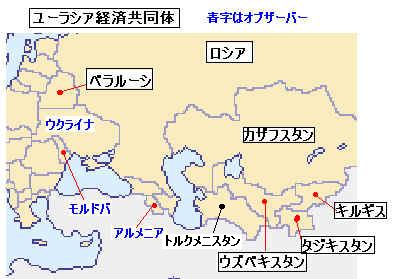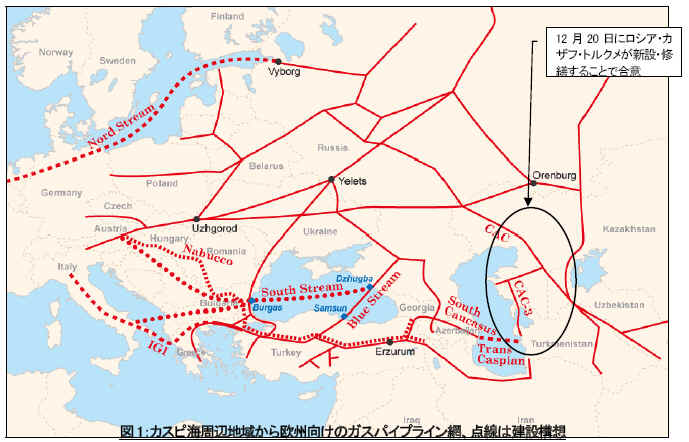日本経済新聞 2008/3/13
天然ガス版OPEC構想 親ロシア国でカルテル
年内にも発足、イラン参加も 米欧揺さぶり狙う
世界最大のガス埋蔵量を持つロシアが、カザフスタンなど旧ソ連の親ロ国と天然ガスの価格や供給網の建設を調整する事実上のカルテルを設立することが明らかになった。イランなどにも参加を要請し、年内にも発足させる。
旧ソ連6カ国(ロシア、カザフ、ウズベク、ベラルーシ、タジキスタン、キルギス)が加盟するユーラシア経済共同体(EurAsEC)が4月にロシアで開く会議で構想を発表する。既にカザフのほか欧州向けガス通過国であるベラルーシが参加に合意した。
EurAsECはロシア、ベラルーシ、カザフスタン、キルギス、タジキスタンの5カ国が2000年に結成に合意、01年に正式発足した。アルメニアやモルドバ、ウクライナがオブザーバーとなり、06年にはウズベキスタンも正式加盟した。加盟国間の関税やヒトやモノの移動の管理を統一して地域の通商貿易運輸を促進するのが狙い。
独立国家共同体(CIS)関税同盟を発展、改組しユーラシア経済共同体を発足させることで合意した。
AESはカザフスタンのナザルバエフ大統領が提唱した構想に沿ったものであり、将来的に欧州連合(EU)のような機構を目指している。

まず欧州向け支配 主要輸出国影響力拡大
天然ガス埋蔵量のシェア
(2006年宋、BPエネルギー統計)
| ロシア |
26.3% |
|
|
| 旧ソ連5カ国 |
2.7% |
旧ソ連6カ国 |
29.0% |
| イラン |
15.5% |
旧ソ連+イラン |
44.5% |
| カタール |
14.0% |
|
|
| サウジアラビア |
3.9% |
|
|
| UAE |
3.3% |
|
|
| その他 |
34.3% |
|
March 11 2008
On working meeting of
Alexey Miller and heads of gas companies from Kazakhstan,
Uzbekistan and Turkmenistan
The
Gazprom Headquarters today hosted a working meeting of Alexey
Miller, Chairman of the Management Committee of Gazprom, Uzakbai Karabalin, President of KazMunaiGaz, Nurmmukhamad Akhmedov, Chairman
of the Management Committee of Uzbekneftegaz and Yagshigeldy Kakaev, Chairman
of Turkmengaz. The meeting addressed the
outlook for cooperation in the gas sector.
During
the meeting the heads of the gas companies from Kazakhstan,
Uzbekistan and Turkmenistan stated that “based upon the interests of the
national economies and considering the international commitments
with regard to the energy supply reliability and continuity,
starting from 2009 natural gas will be sold at
European prices”
−−−
2008/3/14
turkmenistan.neweurasia.net
The above information has
immediately caused a sensation and produced a number of comments
in the Russian and Western media. Most of the commentators have
proclaimed the emergence of a gas OPEC in the
Central Asia, with
members as follows: Turkmenistan, Kazakhstan, Uzbekistan and…
Russia. Media also
anticipated problems that Ukraine will face after the expected
rise of gas prices. Above all, the news was considered as the
success of Moscow who - by announcing the information - has
allegedly hampered the construction of a Trans-Caspian gas
pipeline, instead pushing the Caspian Coastal gas pipeline ahead.
Arkady Dubnov of ‘Vremya Novostey’
wrote:
‘Clearly,
the cartel’s emergence has been triggered
by American and European diplomatic activity in the region.
This activity focused on lobbying an export route of the
Central Asian gas to Europe that would circumvent Russia.
Paradoxically, Gazprom’s consent for the ultimatum
will decisively bury the Trans-Caspian
project, backed by Washington. (…) Moreover, it will reinforce
the common urge of Russia and its Central Asian partners to construct
the Caspian Coastal gas pipeline.
The activity of
Brussels and Washington envoys, who have been persuading
Gurbanguly Berdymukhammedov and Nursultan Nazarbayev to
support the Trans-Caspian pipeline, has played a vital part,
too. (…). By late February a special
US representative in the region Steven Mann actively traveled
between Baku, Ashgabat and Astana, luring local leaders with
promises of European prices for gas. (…) However, the Central Asian
leaders have opted for an easier way of obtaining extra funds
for their gas and started joint talks with Gazprom.’

2007/12/20、ロシア・カザフスタン・トルクメニスタン3カ国間で、トルクメニスタンからロシアまでカスピ海沿岸ガスパイプライン(CAC3)の新設すること等について、合意書に調印した。
既存のカスピ海沿岸パイプラインを改修することに加え、2008年後半から2010年にかけてCAC3を新たにカスピ海沿いに新設することが定められている。
Nonetheless, the Central
Asian ultimatum issued to Moscow makes me draw different
conclusions. In my opinion, it may be a proof of Moscow’s weakness. The ineffectiveness of
Russian policy in the region is being cunningly used by
Turkmenistan, Kazakhstan and Uzbekistan. One of the key
principles of Russian policy in the whole post-Soviet area has
been to divide the former republics as much as possible and to
prevent them from coordinating their policies. Suddenly it turned
out that Ashgabat, Tashkent and Astana have joined forces and
started dictating their terms to Moscow.
Besides, the fact that Russia may pay ‘European prices’ for the Central Asian gas next year does not necessarily
mean that the Great Game is over and that the West and China have
nothing to look for in the region. It should be born in mind that
the Central Asian states are concerned with something more than
just money. They also strive to become politically independent of
Moscow and to balance Russia’s influence in the region by
cooperation with China and the West. Uzbekistan’s recent permission for Americans
to use the airbase in Termez might be an illustration to this
point.
Why then did the Russians
disclose this information themselves? A simple answer comes to
mind: what else could they do? They must have realized that they
are no longer dealing with separate states but, willingly or not,
they must face the three states together. They also realized that
paying more for gas is unavoidable. Therefore Moscow must have
decided to use this unpleasant information to cause some
confusion around the Trans-Caspian pipeline and to demonstrate
that it is capable of paying more for gas, so in this sense the
West has no advantage over Russia.
The fact is, something
like a ‘Central Asian gas OPEC’
has indeed emerged.
However, it is made of three and not four members.
---
2008/3/14 eurasianet.org
Russia makes financial
gamble to retain control of Central Asian energy exports
Kazakhstan, along with
its Central Asian neighbors Turkmenistan and Uzbekistan, will
receive a huge increase in energy-related revenue following a
flurry of regional diplomatic activity. Ukraine, meanwhile,
stands to lose the most under the new pricing framework for
Central Asian natural gas.
The most important
development over the past week or so was a March 11 announcement
by the Russian state-controlled conglomerate Gazprom that,
starting in 2009, it would pay European market prices for Central
Asian natural gas. Gazprom did not specify a price, but given the
current market conditions, Kazakhstan, Turkmenistan and
Uzbekistan can expect to receive somewhere in the range of $200-$300 per
1,000 cubic meters (tcm)
of gas next year. At present, Gazprom is paying up to 180/tcm for Central Asian gas. A statement
issued by Gazprom said the deal was is "based upon the
interests of the national economies and considering the
international commitments with regard to the energy supply
reliability and continuity."
The deal is certain to
hit Gazprom’s bottom line. It could also
potentially cause supply disruptions down the road by sparking
pricing disputes, likely involving Ukraine, which is the key
transit nation for European energy exports. But the Russian
conglomerate’s action helps solidify Moscow’s position as the gatekeeper for
Central Asian energy exports to Western European markets. Over the past year, the
competition over Caspian Basin energy has intensified, with the
United States, European Union and China all seeking to break
Russia’s current stranglehold over
regional export routes.
Gazprom officials have
indicated they do not intend to absorb all of the shock of the
higher costs, but will pass along some of the added expense to
its own consumers. On March 14, Gazprom CEO Alexei Miller
announced that the gas price for European customers could reach
$400/tcm by the end of 2008. Earlier estimates for late 2008 had
pegged the price at $310/tcm.
In addition to the price
hike, Turkmen and Russian officials on March 12 signed a deal on
the transfer of Soviet-era geological and geophysical data
covering Turkmen deposits that had heretofore been kept under
tight control in Moscow. The information could prove useful to
Ashgabat’s efforts to hasten the
development of the country’s energy resources. The pact grew
out of a joint declaration issued in 2007 in connection with the
unveiling of a grand Russian-backed energy export scheme,
centering on the expansion of the Prikaspiisky pipeline network.
The Russian decision to hand over the data at this time is seen
by many regional energy observers as an incentive for
Berdymukhamedov to remain loyal to the notion of Russia’s export primacy in Central Asia.
Russian leaders may now
be feeling more confident about their ability to stay on top of
the regional energy game, but there are plenty of indicators that
their position still cannot be considered secure. The Gazprom
agreement signals that Central Asian energy producers are
developing a sense of unity that could enhance their collective
clout in energy dealings with outside players. For most of the
post-Soviet era, Central Asia’s cohesion has have been hampered
by the inability of regional leaders to work together on a wide
variety of economic and social issues, in particular the
development of natural resources and the distribution of scarce
water resources.
Regional leaders,
however, are clearly working to set aside differences.
Kazakhstan, which will chair the Organization for Security and
Cooperation in Europe in 2010, has been exerting diplomatic
pressure on its neighbors to promote regional stability and
cooperation.
One of the region’s more complicated bilateral
relationships in Central Asia involves Turkmenistan and
Uzbekistan. Relations had been frosty since 2002, when
then-Turkmen leader Saparmurat Niyazov accused the Uzbek
government of involvement in an alleged attempted coup against
his regime. But on March 11, at the conclusion of a state visit
by Berdymukhamedov to Tashkent, the Turkmen leader and his Uzbek
counterpart, Islam Karimov, saluted the restoration of friendly
ties.
If Central Asian leaders
can maintain unity on energy issues, they can become formidable
negotiating partners not only for Russia, but for China and the
West, regional analysts believe. "The boosting of
cooperation in the oil and gas sector between Turkmenistan and
Uzbekistan is capable of dealing a blow to Gazprom’s interests," said a
commentary published in the Kazakhstani newspaper Liter noted.
Meanwhile, a commentary
published in the Vremya Novostei newspaper indicated that Gazprom
did not develop the new gas pricing structure on its own
initiative, but instead had to react to new demands put forward
by Central Asian officials, who perhaps used the Chinese and
trans-Caspian export options as leverage.
"Moscow, which has
speculated several times in international diplomacy with the
threat of setting up a gas OPEC with other major gas exporters,
encountered for the first time a consolidated position from
Turkmenistan, Uzbekistan and Kazakhstan in price
bargaining," the commentary said.
The United States and EU
certainly cannot take comfort from the recent developments, which
would appear to severely dent hopes for the construction of the
planned trans-Caspian-Nabucco export network that would establish
a Western-controlled route that ferries Central Asian gas to
Europe.
But the biggest loser
from recent developments may well be Ukraine, which has long wrestled with
Russia over energy supplies. On March 13, Neftogaz, the Ukrainian
state energy concern, reached a deal with Gazprom that brought an
end to the latest round of bickering between the two countries.
Under the agreement, Ukraine fixed the price it will pay for gas
starting in March and running for the rest of 2008 at $179.50/tcm
Ukraine faces a severe
price increase in 2009, once the higher rates for Central Asian
gas kick in. The skyrocketing prices prompted Ukrainian Prime
Minister Yulia Tymoshenko to declare that Ukraine would like to
conclude a medium-range supply agreement, covering up to five
years, with Gazprom.
During the
Ukrainian-Russian wrangling over the price of gas, Ukrainian
President Viktor Yushchenko headed to Astana for talks with
Kazakhstani President Nursultan Nazarbayev. The discussions
proved bitterly disappointing for the Ukrainian leader, however.
Yushchenko had hoped he could tempt Nazarbayev into an export
arrangement that cut out Russia, striving to gain a Kazakhstani
commitment to the Odessa-Brody pipeline, which Ukraine seeks to
expand. Nazarbayev stated clearly that Russia, in control of oil
transportation, held the key to any decision. "The question
of the Odessa-Brody project remains open. We have to agree with
Russian oil transportation organizations to supply the necessary
volumes to Ukraine," Nazarbayev told a news conference.

